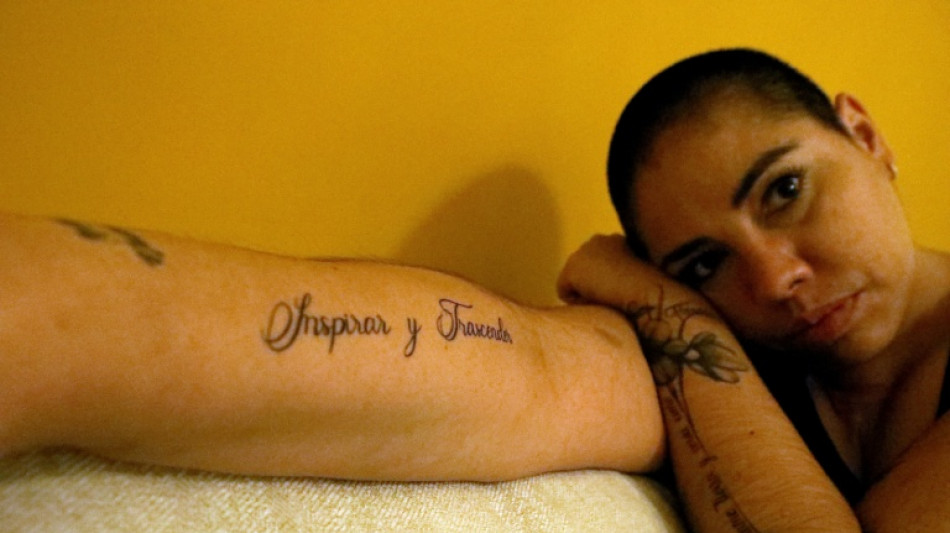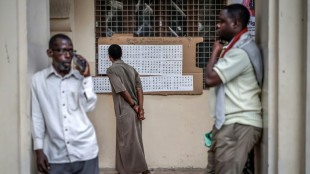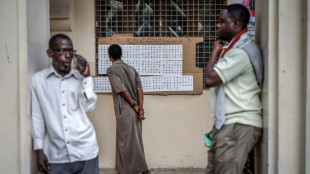
-
 Mercedes-Benz profit plunges on China slump and US tariffs
Mercedes-Benz profit plunges on China slump and US tariffs
-
South Korea gifts Trump replica of ancient golden crown

-
 Record Vietnam rains kill four and flood 100,000 homes
Record Vietnam rains kill four and flood 100,000 homes
-
Norway's energy giant Equinor falls into loss

-
 Asia stocks join Wall Street records as tech bull run quickens
Asia stocks join Wall Street records as tech bull run quickens
-
New Zealand hammer reckless England despite Archer's brilliance

-
 Record potato harvest is no boon in fries-mad Belgium
Record potato harvest is no boon in fries-mad Belgium
-
Deutsche Bank posts record profit on strong trading

-
 UBS beats expectations as claws backs provisions
UBS beats expectations as claws backs provisions
-
German neo-Nazi rappers push hate speech, disinfo on TikTok

-
 US aid flows to Nigeria anti-landmine efforts - for now
US aid flows to Nigeria anti-landmine efforts - for now
-
Low turnout as Tanzania votes without an opposition

-
 Monarch-loving Trump gifted golden crown once worn by South Korean kings
Monarch-loving Trump gifted golden crown once worn by South Korean kings
-
Dutch vote in test for Europe's far right

-
 Fugitive ex-PM says Bangladesh vote risks deepening divide
Fugitive ex-PM says Bangladesh vote risks deepening divide
-
On board the Cold War-style sealed train from Moscow to Kaliningrad

-
 Spain to hold memorial on first anniversary of deadly floods
Spain to hold memorial on first anniversary of deadly floods
-
Trump said 'not allowed' to run for third term, 'too bad'

-
 Unruffled by Trump, Chinese parents chase 'American dream' for kids
Unruffled by Trump, Chinese parents chase 'American dream' for kids
-
Australian police design AI tool to decipher predators' Gen Z slang

-
 Tanzania polls open with opposition excluded
Tanzania polls open with opposition excluded
-
Reckless England set New Zealand 176 to win second ODI

-
 Tanzania votes but with opposition excluded
Tanzania votes but with opposition excluded
-
Coach defends handing Australia captaincy back to Sam Kerr

-
 Thunder, 76ers remain unbeaten with NBA comeback wins
Thunder, 76ers remain unbeaten with NBA comeback wins
-
France expected to adopt consent-based rape law

-
 Blue Jays swat Dodgers 6-2, level World Series
Blue Jays swat Dodgers 6-2, level World Series
-
Australia's Cummins makes tentative bowling return

-
 Veni, vidi, whoopsie: Australian schools make Caesar exam blunder
Veni, vidi, whoopsie: Australian schools make Caesar exam blunder
-
With 100 days to go, Milan Winter Olympics chiefs 'can see finish line'

-
 Pakistan says peace talks with Afghanistan 'failed'
Pakistan says peace talks with Afghanistan 'failed'
-
NZ raids shipping insurer over alleged sanctions busting

-
 Resilient young woman leads fight for euthanasia in Mexico
Resilient young woman leads fight for euthanasia in Mexico
-
'Dangerous Liaisons' gets MeToo twist in prequel 'The Seduction'

-
 As US blows up drug boats, Venezuelan oil sets sail
As US blows up drug boats, Venezuelan oil sets sail
-
US Fed on track to cut rates again in penultimate decision of 2025

-
 North Korea announces missile test hours before Trump due in South
North Korea announces missile test hours before Trump due in South
-
'Arrested for singing': Russia's case against teen busker stirs anger

-
 Hurricane Melissa takes aim at Cuba after roaring across Jamaica
Hurricane Melissa takes aim at Cuba after roaring across Jamaica
-
Ecological Threat Report 2025: Extreme Wet-Dry Seasons Emerge as Critical Conflict Catalyst

-
 Israel launches air strikes on Gaza, says Hamas attacked troops
Israel launches air strikes on Gaza, says Hamas attacked troops
-
Injured Springer out of World Series game four

-
 'No-feeling' Alcaraz eliminated from Paris Masters
'No-feeling' Alcaraz eliminated from Paris Masters
-
Favorite Sovereignty could miss Breeders' Cup Classic after fever

-
 Microsoft holds 27% of OpenAI in revamped partnership
Microsoft holds 27% of OpenAI in revamped partnership
-
Bronze nets birthday goal as England's women beat Australia

-
 'Catastrophic' hurricane slams Jamaica with fierce winds and rain
'Catastrophic' hurricane slams Jamaica with fierce winds and rain
-
Cameroon blames post-vote deaths on opposition leader

-
 Cubans flee the coast as Hurricane Melissa looms
Cubans flee the coast as Hurricane Melissa looms
-
Trump heads to South Korea with all eyes on Xi meeting


Resilient young woman leads fight for euthanasia in Mexico
Samara Martinez, a young Mexican woman who is sick and dying, smiles as she asks her many TikTok followers a difficult question.
The 30-year-old lives with several chronic and degenerative diseases, including kidney failure, and spends 10 hours a day hooked up to a dialysis machine to survive.
"Instead of seeking euthanasia, why don't I just unplug the machine and say goodbye?" Martinez, a journalist by trade, says in her video.
She then explains to her nearly 400,000 followers what it is like to suffer from several terminal diseases -- and why she is spearheading a campaign to legalize a person's right to euthanasia in Mexico.
As she prepares to answer her initial question, the camera zooms in on Martinez's face for a close-up.
"Because I do not want to suffer and I want to die with dignity," she says.
A paradox is at work here: as she advocates for such a gravely serious issue as death, Martinez does so with vigor, enthusiasm and creativity over social media.
Her work helps her "stay alive," Martinez told AFP during an interview at her home in the city of Chihuahua in northern Mexico.
"Social media also serves to change the world," said Martinez, who feels that before she became a social media influencer she was an "agent of change."
After undergoing two failed kidney transplants, and with no possibility of being cured, in August she launched her campaign for Mexico to give people the right to die with dignity.
"I am going to be the person who legalizes euthanasia in Mexico," said Martinez.
She expressed confidence that she will succeed because, unlike previous campaigns with the same goal, this time it is a sick patient at the forefront.
Earlier this month, Uruguay became the first country in Latin America to decriminalize euthanasia through a law passed by congress. Colombia and Ecuador did the same in 1997 and 2024, respectively, through court rulings.
- For love and respect -
After more than a decade striving to get healthy, deciding she was ready to die posed a dilemma for Martinez.
She asked her parents what they thought. "We support you," she said they told her.
"I am doing it for myself, and for the respect I have for my body, and because I love myself so much. That is what is behind all this," said Martinez.
With stoicism and good humor that could stun the many people who watch her online, Martinez explains her end-of-life decision.
"It is not that I gave up. Rather, I have unblocked that part of understanding which says death is not an enemy, that it is not pain. Death is a sister, a friend, and one embraces it."
Sitting in her office at a university in Chihuahua, where she is a tenured professor, Martinez analyzes her options.
She says in a steady voice that no one can make her keep doing dialysis.
"I would take 15 days to die, but those would be 15 days of agony and suffering because your whole body is poisoned. You can drown in your own liquids. It is a very undignified death," said Martinez.
To stop dialysis, she said, would be a form of passive euthanasia -- withholding treatment that would keep a dying person alive.
Another option is to resort to a law in Mexico under which a person sound of mind can ask that their life not be prolonged artificially and they only be given palliative care until they die.
This week, Martinez herself will present to the Mexican Senate a bill to make euthanasia part of Mexico's body of law, letting people decide when they want to die and to do so without unnecessary suffering.
The lower chamber of congress must also approve the initiative.
"It is high time we stopped penalizing compassion," said Martinez.
She has amassed 118,000 signatures on a petition backing her idea and is now trying to win over lawmakers.
When the time comes, Martinez envisions expiring by the sea, at dusk, with a quiet ceremony.
"A celebration of life with my family, surrounded by people I love and who love me, and going peacefully, with no pain," she said.
W.Huber--VB




